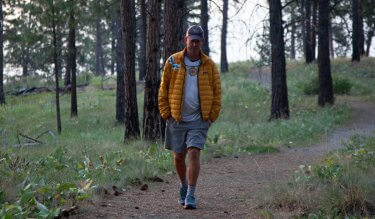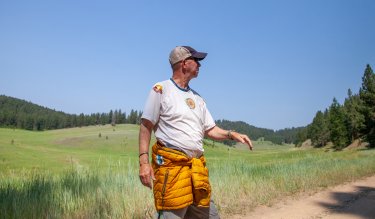What began as a routine training exercise turned into one of the hardest days of Kenneth Perry’s life. It was a clear Saturday afternoon in April, 2001. Perry, now a retired firefighter from Kern County, Calif., was supervising a round of practice jumps with a team of smokejumpers — wildland firefighters who parachute into remote fires — when one teammate’s parachute didn’t open properly. The entire crew watched helplessly as their friend plummeted toward Earth in free fall.
“He fell all the way to the ground,” Perry recalls.
From their vantage point, nobody could see where he landed, so the crew immediately began searching the entire area. “We all fanned out. Everybody went looking for him.” Perry grabbed a trauma kit from the truck and set off running. At some point during the search Perry tripped and twisted his back. He felt something give out. His adrenaline levels were so high, however, that the immediate pain was not terrible. “It didn’t drop me,” he says. “I was able to continue the rescue attempt.”
Shortly after, Perry was the first to find the victim.
The firefighter did not survive. “Dealing with a fatality face to face,” Perry says, “was very difficult. He was a rookie. He’d just gotten married.”
Perry was familiar with The Wildland Firefighter Foundation, a group devoted to providing financial assistance to fallen firefighters and their families. And while he was able to make it through his crisis without their help, he gained a new appreciation of why the group was so necessary. “In a perfect world we wouldn’t need a welfare fund,” he says. “But we do.”
Where To Go from Here?
Once his condition stabilized, Perry found himself faced with a new set of hard questions. His dream job was a thing of the past — a job he’d been doing since 1985 — and he was no longer capable of pursuing the activities he loved most. A lifelong passion for the outdoors had drawn Perry to wildland firefighting in the first place, and now even simple garden work had become an ordeal. He couldn’t help but wonder, “What do I do with my life?”
He found the answer somewhere that only months before would have seemed all but impossible.
After some successful surgeries, the pain in Perry’s back subsided. His range of motion was still limited, but he was finally able to run again. Emotionally, it was a big deal. “Being a smokejumper,” he says, “endurance was my life.”
Perry began striking out into the woods by himself, running along the trails for ten, sometimes twelve miles. “I would just feel better after that,” he recalls. “That was the start of the next chapter.”
The fundraiser ended up getting more attention than anybody expected. “When we got down to Santa Clarita, the LA County Fire Department was blocking traffic with fire engines. It was wild.” As Perry approached the finish line, people on the sidelines began pulling out their checkbooks to make donations on the spot. “We ended up raising somewhere close to eighty thousand dollars on that first run.”
Another Round
The following year, Burk Minor received another call from Perry. He wanted to do another run. Only this time, Perry had his sights set on an even longer distance. “Let’s double it,” he said. One hundred four miles through the desert of Southern California.
“I just about fell back in my chair,” Minor says. “I thought he was out of his mind.”
But Minor trusted Perry’s judgment and the run went on. For a while it looked like the event would go off without a hitch. Somewhere in the second half, however, something went wrong.
“It was probably around two or three o’clock in the morning,” Perry recalls. “My knee was shot. I just couldn’t go any further.” A group of Perry’s friends and colleagues stepped in to pull him from the race. It was a hard realization after so many miles, and Perry did not want to quit. “I started this to make people think about what they could do,” Perry says. “But I failed.”
Nevertheless, firefighters always look after their own. Some of Perry’s friends decided to finish the race for him. Perry took some time to recover on the sidelines, and eventually he was able to get back on the road. As the runners approached the end, some of the others began pushing Perry toward the finish line. But to Perry, being the first to cross didn’t feel right. “We’re finishing this together,” he told them. “That,” Perry says, “is the whole idea of the Wildland Firefighter Foundation. Firefighters helping firefighters.”
A Tragic Necessity
With the global spike in wildfire activity, the WFF has been busier than ever. “The foundation has already been involved in 29 fatalities this year,” Minor says. But Perry and his colleagues are still there for each other. “Every time I talk to one of my buddies,” Perry says, “I tell them, ‘Hey, I love you.’ Sometimes you get heart emojis.”
While Perry and his friends will always relish sitting around a campfire, swapping stories and frying SPAM® brand products on shovel blades, they end each gathering with a moment of silence — a time to remember those brothers and sisters who are no longer with them. “We’re a family,” Perry says. “We all rely on each other.”
www.wffoundation.org
To Kenneth Perry and all the smokejumpers who risk their lives to save others, you inspire us. Hormel Foods is proud to support the Wildland Firefighter Foundation. Learn more at:

